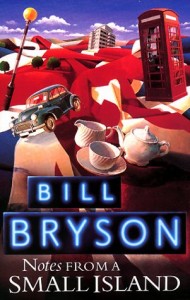 I don’t know why I suddenly decided to reread Notes from a Small Island this time, but it was probably related to being rather clogged up with a flu of sorts (there is comfort food and then there are comfort books). Anyway, I just need to tell you all again how much I love this book. Notes from a Small Island is the book I’d have written about Britain if I were a writer. It’s Bryson saying goodbye to his adopted country before going to live in the States for a while, and it’s brimming with love tinged with regret. It’s Bryson being homesick before he has even left.
I don’t know why I suddenly decided to reread Notes from a Small Island this time, but it was probably related to being rather clogged up with a flu of sorts (there is comfort food and then there are comfort books). Anyway, I just need to tell you all again how much I love this book. Notes from a Small Island is the book I’d have written about Britain if I were a writer. It’s Bryson saying goodbye to his adopted country before going to live in the States for a while, and it’s brimming with love tinged with regret. It’s Bryson being homesick before he has even left.
I’ve said it before, but the thing about Bryson’s love for Britain is that he loves it the exact same way I love it, quirks and idiocies included. He even seems to share my opinion on certain national heroes:
I watched out for Tintern Abbey, made famous, of course, by the well-known Wordsworth poem, ‘I Can Be Boring Outside the Lake District Too’
(Page 149.) He also travels a bit like I prefer to do if circumstances allow, letting his destination be decided by chance or by whim, going to Wigan because a bus for Wigan comes past just when he’s got The Road to Wigan Pier in his back pocket (page 230). As good a reason as any, if you ask me. I once went to Preston with a friend just because we wondered what a place sharing a name with the cyber dog in Wallace & Gromit: A Close Shave could possibly be like. I don’t think we had any great epiphanies, but we had a grand day out.
And that’s something I’ve mentioned before as well, but Bryson actually really seems to enjoy travelling, including the less glamorous bits, like waiting for a bus or getting caught in the rain. He seems to acknowledge and accept that it’s all part and parcel and imparts the same feeling to the reader, making you really want to just get up and go somewhere, anywhere (though preferably Britain, it must be said).
And he’s funny. It’s definitely the sort of book you shouldn’t be reading in public if snorting at books in public embarrasses you.
The big event in Thurso, according to civic records, was in 1834 when Sir John Sinclair, a local worthy, coined the term ‘statistics’ in the town, though things have calmed down pretty considerably since.
(Page 325.) So this is my love letter to a book that is a love letter to a place I love. I might have come to the conclusion that I’d rather live in Norway, but that is as much a practical decision (I like my family and would like to see them more than twice a year, for example). It’s been fourteen years since I left Britain, and I still get pangs of «homesickness» quite regularly and start to wonder if there isn’t some way of moving there again that would magically work on a practical level (I need a teleporter, that would solve all of my problems).
Suddenly, in the space of a moment, I realized what it was that I loved about Britain – which is to say, all of it. Every last bit of it, good and bad – Marmite, village fêtes, country lanes, people saying ‘mustn’t grumble’ and ‘I’m terribly sorry but’, people apologizing to me when I conk them with a careless elbow, milk in bottles, beans on toast, haymaking in June, stinging nettles, seaside piers, Ordnance Survey maps, crumpets, hot-water bottles as a necessity, drizzly Sundays – every bit of it.